

FDR's New Deal: Social Security Act and National Labor Relations Act. Great Depression. A worldwide depression struck countries with market economies at the end of the 1920s.
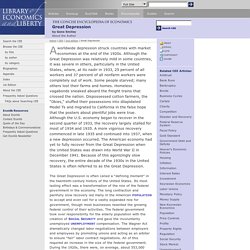
Although the Great Depression was relatively mild in some countries, it was severe in others, particularly in the United States, where, at its nadir in 1933, 25 percent of all workers and 37 percent of all nonfarm workers were completely out of work. Some people starved; many others lost their farms and homes. Homeless vagabonds sneaked aboard the freight trains that crossed the nation. Great Depression. Liberté négative contre liberté positive : responsabilité, initiative individuelle et prise de risque. Introduction Le défi auquel nous devons faire face aujourd’hui n’est plus seulement celui du socialisme, au sens traditionnel, justice sociale et égalitarisme, c’est celui d’une nouvelle idéologie : la société sans risque.
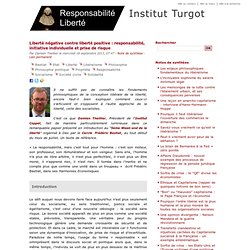
La bonne société apparaît de plus en plus comme une société stable, prévisible, transparente. Une véritable peur du progrès technologique génère une demande croissante de sécurité et de protection. Et dans ce cadre, le marché est intolérable car il fonctionne selon une dynamique d’innovation, de prise de risque et d’incertitude. Paradoxe de notre temps, l’usage du terme « responsable » est omniprésent dans le discours social et politique alors que, dans le même temps, l’individu se voit de plus en plus dessaisi de la maîtrise de son destin. Commençons donc par définir les termes. Par définition, toute action, tout choix s’expose au risque de l’échec ou de l’erreur. La liberté positive, par contre, est liée à l'individu en tant qu'être agissant. New Deal Cultural Programs. Experiments in Cultural Democracy by Don Adams and Arlene Goldbard © Copyright Adams & Goldbard 1986, 1995 Introduction: Federal Cultural Programs of the 1930's Franklin Delano Roosevelt's New Deal cultural programs marked the U.S. government's first big, direct investment in cultural development.
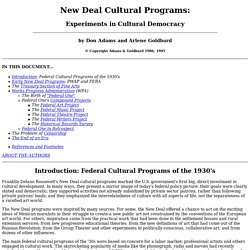
"What is Liberalism?" Political Theory (forthcoming, 2014) It is an “all purpose word” i s thus unsurprising, for liberalism has become the metacategory of Western political discourse.
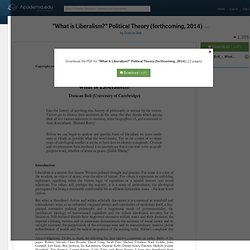
There are several responses to “overextension”. One is simply to ignore it, deploying the term as. The Hoover New Deal of 1932 - - Mises Institute. The Hoover New Deal of 1932 President Hoover came to the legislative session of 1932 in an atmosphere of crisis, ready for drastic measures.
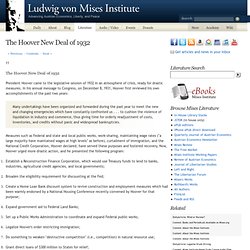
In his annual message to Congress, on December 8, 1931, Hoover first reviewed his own accomplishments of the past two years: Many undertakings have been organized and forwarded during the past year to meet the new and changing emergencies which have constantly confronted us . . . to cushion the violence of liquidation in industry and commerce, thus giving time for orderly readjustment of costs, inventories, and credits without panic and widespread bankruptcies.
Measures such as Federal and state and local public works, work-sharing, maintaining wage rates ("a large majority have maintained wages at high levels" as before), curtailment of immigration, and the National Credit Corporation, Hoover declared, have served these purposes and fostered recovery. Great Depression. Kennedy on the Great Depression and the New Deal. Liberté négative contre liberté positive : responsabilité, initiative individuelle et prise de risque. First Measured Century: Interview: David M. Kennedy. Kennedy on the Great Depression and the New Deal. FDR's Big Government Legacy- Boston Fed. Summer 1997 by William J.
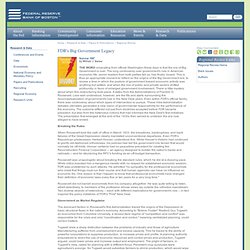
Barber THE WORD emanating from official Washington these days is that the era of Big Government is over. The long controversy over government's role in American economic life, senior leaders from both parties tell us, has finally closed. This is thus an appropriate moment to reflect on the origins of the Big Government era, to review a time in which the posture of government toward economic activity was anything but settled, and when the mix of public and private sectors shifted profoundly in favor of enlarged government involvement. There is little mystery about when this restructuring took place. Breaking the Rules. 2006 Beyond the New Deal. Dossier - Nouvelle Gauche US. Sgvol38.pdf (application/pdf Object) Viewcontent.cgi (application/pdf Object) September 11th as a response to the USA external policy - Hugues SERAPHIN. ************ September 11th was a day that will stay within our minds for the rest of our lives.
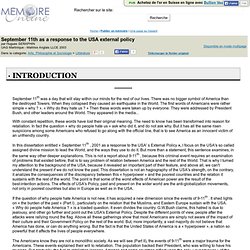
There was no bigger symbol of America than the destroyed Towers. When they collapsed they caused an earthquake in the World. » Essay on environmentalism: L3 student paper - valeriemorisson. Tania Charles SHS AMC Is environmentalism a form of western elitism? Over time, the world has become more and more aware of the need to protect the planet. Saving our environment is now a priority. But it is also a huge challenge since our ways of life completely depend on bad habits that have a direct influence on the environment. Therefore, we have tried to create alternatives and laws that would make everyone feel more concerned. From the moment environment issues became a priority, well developed states such as France, Great Britain or The United States have put pressure on countries such as India or China. The Rise of Innovative State Capitalism. Over the past five years, as much of the developed world has staggered through crisis, a new type of capitalism has emerged as a challenger to laissez-faire economics.
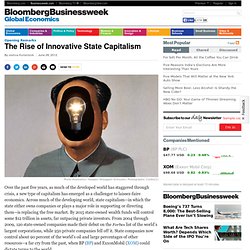
Across much of the developing world, state capitalism—in which the state either owns companies or plays a major role in supporting or directing them—is replacing the free market. By 2015 state-owned wealth funds will control some $12 trillion in assets, far outpacing private investors.